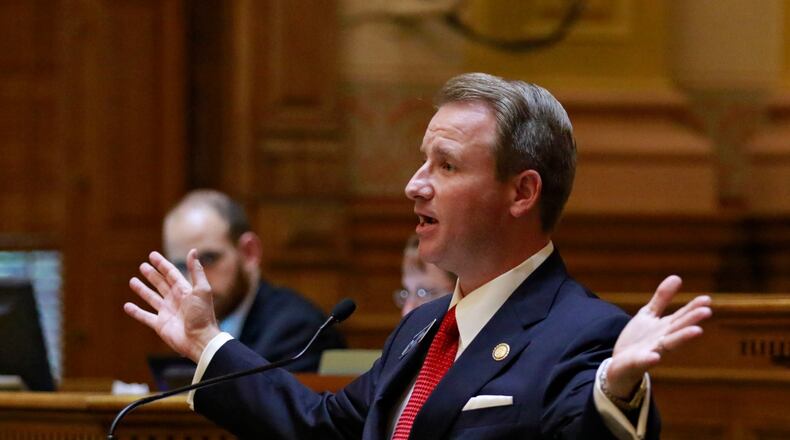Legislation moving through the Georgia Senate aims to do something truly revolutionary: mandate that the state do an economic analysis on any special-interest tax break before the General Assembly votes on it.
Such a concept might seem like common sense. But passage of such tax breaks — which happen numerous times each General Assembly session and cost the state hundreds of millions of dollars in revenue — often occur after supporters provide testimony or data from industry lobbyists or other parties that would benefit. Those advocates typically tell lawmakers the tax break will create or save jobs, and legislators give the OK.
Many times such tax breaks pass in the final hours of a legislative session, when lawmakers are taking hundreds of votes and have little time to review what they are voting on.
Sometimes lawmakers later review what happens after the tax breaks pass, sometimes not.
Some of that may be changing with new leadership and makeup of key committees.
Nonetheless, Senate Bill 119 and Senate Bill 120, by state Sen. John Albers, R-Roswell, set up a mechanism to force lawmakers sponsoring such bills to have an economic analysis done of their tax-break proposals before they are voted on, and puts five-year sunsets on them. Before the tax breaks come up for renewal, a review of their impact — in other words, if they created jobs or met some other goals — would be done.
“We want to make sure we are good fiduciaries, and the best way to do that is complete a comprehensive business case and then to have that business case validated by a third party,” Albers said. “If we do those, we know we are doing the responsible thing for Georgia to get a return on its investment.”
Albers’ bills unanimously passed the Senate Finance Committee on Thursday and now head to the full Senate for a vote. The bills passed the Senate 55-0 last year but hit a roadblock in the House.
House Ways and Means Chairman Brett Harrell, R-Snellville, said he and other House members liked the idea, but they had some questions last year about how it would work.
“I like the concept of doing a periodic analysis of the various tax credits,” said Harrell, who added that both chambers are beginning to review current tax-break laws. “Some of the things we have done in the past have served their purpose and it may be time to take them off the books.
“At the end of the day, we want to make sure the taxpayers are getting a return on their investment. This is their money.”
All tax-break bills start in the House, and the pattern has long been set on how they take place. The House Ways and Means meeting room overflows each January through March with lobbyists, often representing individuals, companies or entire industries wanting to either get a tax break or stop taxes from being put on them.
Frequently, questions are directed at lobbyists for those supporting a tax break because they are the ones with all the information that they say justifies what they are asking for.
They range far and wide — from a sales tax break passed in 2017 for the owners of mega-yachts to get repairs done at a Savannah boatyard, to a jet-fuel tax break first passed in the mid-2000s that saves Delta Air Lines $40 million a year. This year the Ways and Means Committee, with Harrell as its new leader, is keeping a busy schedule, with railroads among those asking for a tax break.
Getting lawmakers to change the system — as Albers is asking — may be a tough sell. Many of the individuals and companies with a stake in the process are big political donors to lawmakers, as are their lobbyists. And lawmakers love the idea of touting tax breaks and “economic development” on the campaign trail.
Making Albers' bill particularly problematic in the current legislative environment is that several tax breaks might be tacked onto a single piece of legislation — called a "Christmas Tree" — at the end of the session. Changes are made at the last minute. It would be difficult to get an economic analysis of legislation that has four or five different tax breaks attached to it in a relatively short period of time.
But Harrell said there is less of that than there used to be, and he expects such last-minute Christmas trees will not be as frequent in the future.
State Sen. Nan Orrock, D-Atlanta, a member of the Senate Finance Committee, noted that many current special-interest tax breaks are permanent, so they wouldn't be reviewed under Albers' bill. While there are tax breaks with sunsets — they are reviewed every two or three years — some of the most lucrative ones are put into law in perpetuity.
Still, Orrock said Democrats have backed measures like Albers’ in recent years as the General Assembly approved hundreds of millions of dollars in tax breaks.
“Many of us have been pushing for years to attempt to put a process in place to have some accountability for these tax giveaways,” Orrock said. “These are tax expenditures, they are revenues that don’t come into our state budget, and then we are short (of money).
“These giveaways eat holes in the budget. It’s kind of like a silent termite. Out of sight, but nibbling away.”
Stay on top of what’s happening in Georgia government and politics at ajc.com/news/georgia-government/.
About the Author
Keep Reading
The Latest
Featured




